US asks judge to break up Google’s advertising technology monopoly
Sign up now: Get ST's newsletters delivered to your inbox

Google’s lawyers countered that the government’s proposals were extreme.
PHOTO: AFP
ALEXANDRIA, Va. – The Justice Department said on Sept 22 that Google should be broken up to address its monopoly in advertising technology, kicking off a hearing that could reshape the technology giant’s power online.
Judge Leonie M. Brinkema of the US District Court for the Eastern District of Virginia ruled in April that Google had built a monopoly over tools that websites use to sell ad space. Google also monopolised the software that connects those publishers with markets looking to buy space, she said.
On Sept 22, she began hearing arguments from the government and the company over how to best fix Google’s monopoly. Ms Brinkema is expected to order those measures, known as remedies, in the coming months.
In an opening statement in the hearing, the government said Ms Brinkema should force Google to sell the software that connects buyers with sellers. She should also open up the computer code that powers the tools publishers use to auction ad space.
“Nothing short of a structural divestment is sufficient to bring meaningful change,” said Ms Julia Tarver Wood, the Justice Department’s lawyer.
Google’s lawyers countered that the government’s proposals were extreme and offered more modest changes to the company’s advertising software that would benefit publishers, among other smaller fixes.
The solutions were “tailored, as law requires, to technology in the case at hand and the complexity of the ad tech system,” said Ms Karen Dunn, Google’s lawyer, who is a partner at Dunn Isaacson Rhee.
The arguments are Google’s latest attempt to avoid a breakup. Ms Brinkema signaled in a May hearing that she was considering forcing the company to sell a part of its advertising technology business.
That could change Google’s fortunes. Earlier this month, the company dodged a breakup in a case related to its monopoly in internet search. In that case, the judge did not follow the government’s request to force a sale of Google’s popular Chrome web browser. Instead, he ordered the company to share its search results with rivals and adjust some of the contracts it negotiates with companies like Apple to be the automatic search engine in web browsers and on smartphones.
The hearing, which is expected to last two to three weeks, stems from a government lawsuit against Google in 2023, in which the Justice Department claimed the company used its control over ad technology to take a larger share of ad sales than would have been possible in a free market. NYTIMES


